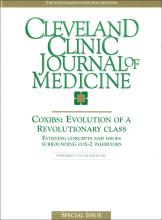ABSTRACT
Aspirin and nonselective nonsteroidal anti-inflammatory drugs (NSAIDs) are widely used for their anti-inflammatory and analgesic effects. In addition, aspirin is documented to reduce cardiovascular events in selected populations, presumably because of inhibition of platelet aggregation. Yet these drugs are not without toxicity, particularly adverse effects on the gastric mucosa. The gastrointestinal toxicity of nonselective NSAIDs and aspirin derives from the inhibition of the cyclooxygenase (COX) enzyme, COX-1, which synthesizes gastroprotective prostaglandins, while the anti-inflammatory and pain-relieving effects are largely derived from inhibition of COX-2–derived prostaglandins. Available data indicate that the harmful gastric effects of nonselective NSAIDs are reduced by substitution of agents that only inhibit the COX-2 protein. The COX-2–selective inhibitors, however, have also been shown to inhibit the production of vascular prostacyclin, which has vasodilatory effects and inhibits platelet aggregation; unlike nonselective NSAIDs, they do not inhibit the production of thromboxane, an eicosanoid that promotes platelet aggregation. Whether these effects could potentially contribute to a prothrombotic environment is the subject of current, intensive debate. In the Vioxx Gastrointestinal Outcomes Research (VIGOR) trial, there was a higher incidence of cardiovascular thrombotic events in the rofecoxib-vs the naproxen-treated group: 1.67 vs 0.70 per 100 patient years. However, in a pooled analysis of rofecoxib studies, the risk of sustaining a thrombotic cardiovascular event was similar when comparing patients receiving rofecoxib with those receiving placebo, or when comparing patients receiving rofecoxib with those receiving non-naproxen nonselective NSAIDs. These findings are likely to result, at least in part, from the antiplatelet action of naproxen, which has been shown to be potent and sustained during a typical dosing regimen (500 mg twice daily in VIGOR). In contrast, the other NSAID comparators effect weaker and/or nonsustained antiplatelet action. In the Celecoxib Long-term Arthritis Safety Study (CLASS) trial, there was no difference between celecoxib and the nonselective NSAIDs explored (which did not include naproxen) in cardiovascular event rates. Unlike those in VIGOR, patients in the CLASS trial were allowed to take low-dose aspirin. Thus, despite concerns raised by results of VIGOR, other existing data, including those pooled from existing placebo-controlled trials, do not support a clinically relevant prothrombotic effect of the COX-2 inhibitors. Additional placebo-controlled data, from patients at both high and low risk for cardiovascular events, are warranted to clarify the cardiovascular effects of this class of agents.
- Copyright © 2002 The Cleveland Clinic Foundation. All Rights Reserved.






